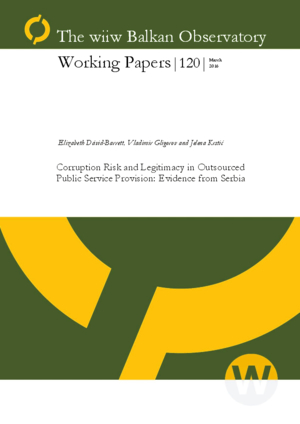Corruption Risk and Legitimacy in Outsourced Public Service Provision: Evidence from Serbia
Elizabeth Dávid-Barrett, Vladimir Gligorov and Jelena Krstić
wiiw Balkan Observatory Working Paper No. 120, March 2016
Abstract
The provision of public services is an important way for weak states to build legitimacy, as long as the public regards the allocation of resources as impartial and fair. However, in societies where resources have long been distributed according to particularist and informal ties, it may be difficult to ensure an impartial allocation. We argue that the challenge of using service provision to build state legitimacy is complicated by the wider trend towards increasing private provision of public services. This makes it harder to hold the state to account for service provision, especially in transition and developing-country contexts where the distinction between the public and private spheres is in any case blurred. To explore these issues in the context of Serbia, the paper focuses on the public procurement process. We discuss process and outcome indicators of corruption risk in Serbian public procurement, assess the institutional control framework, and consider four recent cases of irregularities that are indicative of corruption risk.
Keywords: public procurement, outsourcing, corruption, patronage, legitimacy, transition, ccountability
Countries covered: Serbia
Research Areas: Macroeconomic Analysis and Policy
